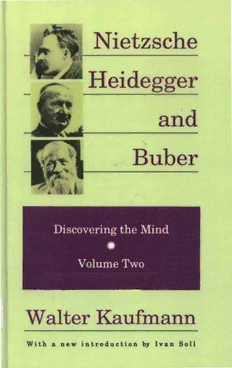
Discovering the Mind, Vol 2: Nietzsche, Heidegger, and Buber PDF
Preview Discovering the Mind, Vol 2: Nietzsche, Heidegger, and Buber
Nietzsche Heidegger and Buber Discovering the Mind • Volume Two Walter Kaufmann Wit han e win t rod u c t ion by I van S 0 JI NIETZSCHE, HEIDEGGER, AND BUBER Discovering the Mind Volume 2 Walter Kaufmann with a new introdllction by Ivan SoIl • TraIlsaction Publishers New Brunswick (U.S.A.) and London (U.K.) Discovering the Mind Walter Kaufmann with new introductory essays by Ivan SoIl Volume I Goethe. Kant. and Hegel Volume II Nietzsche.lleidegger. and Buber Volume TIl Freud. Adler. and lung Fourth printing 2002 New material this edition copyright © 1992 by Transaction Publishers, New Brunswick, New Jersey 08903. Originally published in 1980 by McGraw-lliU Book Company. Copyright © 1980 by Walter Kaufmann. All rights reserved wtder International and Pan-American Copyright Conventions. No part of this book may be reproduced or transmitted in any form or by Illy means, e1ec uonic or mechanical, including photocopy, recording, or any information storage and retrieval system, without prior pennission in writing from the publisher. All inquiries should be addressed to Transaction Publishers, Rutgers-1be State University, New Brunswick, New Iersey 08903. library of Congress Catalog Number. 90-11108 ISBN: 0-88738-394-7 Printed in the United States of America library of Congress Cataloging-in-Publication Data (Revised for volume 2) Kaufmann, Walter Arnold. Discovering the mind. ReprinL Originally published: New York: McGraw-Hill, 1980. Includes bibliographical references and index. Contents: v. 1. Goethe, Kant, and Hegel. v. 2. Niewche, Heidegger, and Buber. 1. Philosophy of mind-History. 2. Self-knowledge, Theory of-History. 3. Philos ophy, Gennany-19th century. I. Title. B0418.3.108 1990 193 [B) ~11108 ISBN: 0-88738-370-X (pbk.) (Volume I) ISBN: O-g8738-394-7 (Volume 2) Nietzsche in 1882. Heidegger. Suber in 1960. Contents ~ Introduction to the Transaction Edition ~ xvii Prologue 1. The second volume and the first. ~ 3 2. Why Nietzsche, Heidegger, and Buber? ~ 4 3. "I personally knew Heidegger and Buber." ~ 5 4. "How do we find ourselves?" ~ 7 5. Interpretation and emendation of the Nietzsche quotation. ~ 8 I. Kierkegaard and Schopenhauer 6. Why Kierkegaard and Schopenhauer? ~ 15 7. Kierkegaard as a psychologist. ~ 17 8. Kierkegaard on despair. ~ 27 9. Schopenhauer as a psychologist. ~ 31 10. Schopenhauer on insanity and repression. ~ 36 11. Eduard von Hartmann and Carl Gustav Caruso ~ 39 II. Nietzsche: Consciousness as a Surface and the Will to Power 12. "A psychologist without equal." Freud on Nietzsche. "Liberating psychology from the tyranny of morals." Love is not unegoistic. ~ 47 13. "Listening with the third ear." ~ 53 14. "Nietzsche's first major contribution to the discol)ery of the mind . .. 'consciousness is a surface. ", "All of our so-called consciousness is a more or less fantastic commentary on an unknown . .. but felt text." Troilus and Cressida. est. ~ 54 15. Resistance, including resistance to Nietzsche's psychology. "There is more reason in your body than in your best wisdom." ~ 64 16. "Nietzsche's second major contribution . .. his theory of the will to power. Resistance to this theory has taken principally three forms." ~ 70 17. "Nietzsche saw himself not as a metaphysician but as a man who tried to get as much scientific mileage as possible out of a psychological hypothesis." ~ 71 18. The will to power versus the will to life. ~ 79 19. The will to power versus the striving for pleasure. ~ 83 20. The meaning of "power" and the contrast of "the strong and the weak." Not all power is power over other people. One-upmanship. Solzhenitsyn. The First Circle. ~ 90 21. "A brief evaluation of Nietzsche's theory." Three attempts to discredit it. Stephen Potter. est. Hitler. Women. St. Paul. Camus. ~ 103 22. "Universal laws" versus "a mere working hypothesis." ~ 112 III. Nietzsche: Psychology of World Views, Psychohistory, and Masks 23. "Nietzsche's third major contribution . .. 'the psychology of world views.''' Resentment. Psychology of faith. ~ 119 24. "Nietzsche's fourth major contribution. . he pioneered psychohistory." ~ 130 25. "The origin of the 'bad conscience.'" ~ 134 26. "Nietzsche's fifth and final contribution . .. his philosophy of masks." The relevant material. Contrast with Sartre. ~ 137 x ~ CONTENTS 27. Nietzsche "did not think of masks as necessarily inauthentic and evil." Roles and women. ~ 141 28. "How can Nietzsche reconcile his non-judgmental attitude toward masks. . . with his celebration of 'the intellectual conscience'?" ~ 148 29. "Whatever is profound loves masks." ~ 151 30. "Many German philosophers . .. Iwve tried to reconcile Kant and Nietzsche." ~ 164 IV. Heidegger's Dogmatic Anthropology 31. "It was Heidegger's discovery of Nietzsche that precipitated the later phase of his philosophy." "[ am no philosopher." "[ am a 'Christian theologian.'" ~ 169 32. "H eidegger's reading of Nietzsche rests on three very clear and simple principles." ~ 172 .33. "The central point of m1/ critique of Heidegger is to show how he impeded the discor:er1/ of the mind." "His influence." "[ shall concentrate on S&Z." ~ 176 34. "First thesis: Heidegger's 'existential ontology' is dubious anthropology." ~ 181 35. "Second thesis: Heidegger's thinking is deeply authoritarian." ~ 189 36. "He says a hundred things I've been unconsciously hoping to hear from someone who could assert them with authority." "Husserrs and Heidegger's bias against empirical science and pS1/chology in particular was rooted in their hunger for certainty and apodictic discourse." ~ 195 37. "Third thesis: Heidegger's analysis of authenticity and inauthenticity is shallow and Manichaean." ~ 197 38. "Fourth thesis: Heidegger neither solved important problems nor opened them up for fruitful discussion; he covered them up." ~ 202 39. "Fifth thesis: S&Z belongs to the romantic revival " ~ 205 Contents ~ xi
